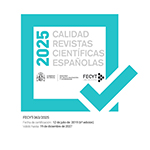Education and women in educational series: La otra mirada as case study
Abstract
: Introduction. Television series have a relevant specific weight as a means of entertainment for society and, moreover, as an essential educational and teaching tool, through which valuable lessons can be transmitted. Objectives. This present article focuses on the study of the Spanish fiction television series La otra mirada, which is directly linked to the role of women in the 1920s in Spain, which main objective is to analyze, in a transversal way, the association of stereotypes and female roles to the different characters, as well as to know the teachings transmitted through this series. Methodology. To this end, a qualitative methodology was used, analyzing the characters and themes of the series from a didactic perspective, analyzing the two seasons of the series, with a total of 21 episodes, studying both the characters and themes. Results. As the main results, the pedagogical value of the series stands out, introducing the teaching of historical female characters who achieve important milestones for society in general, and for women in particular, as well as the specific weight of the protagonists of the series when facing challenges in their personal lives, such as divorce, homosexuality, women’s suffrage, or rape. Conclusions and Discussion. The main protagonists of the series are convinced that a change in society is needed and have a strong personality; however, at the same time they have certain insecurities in their personal lives. Likewise, it can be seen how the teachings gathered in this series can be applied nowadays, in order to make known among the population figures as relevant to society such as Elena Maseras, Carmen de Burgos or María de Maeztu.
Downloads
Article download
License
In order to support the global exchange of knowledge, the journal Investigaciones Feministas is allowing unrestricted access to its content as from its publication in this electronic edition, and as such it is an open-access journal. The originals published in this journal are the property of the Complutense University of Madrid and any reproduction thereof in full or in part must cite the source. All content is distributed under a Creative Commons Attribution 4.0 use and distribution licence (CC BY 4.0). This circumstance must be expressly stated in these terms where necessary. You can view the summary and the complete legal text of the licence.











